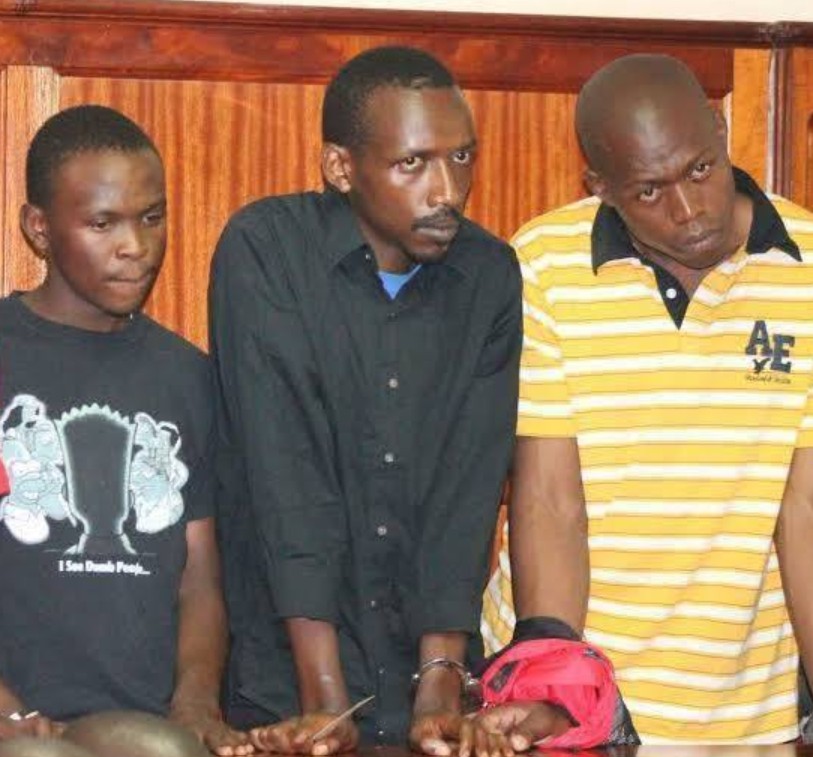In 2011, George Muchai, a trade unionist, politician, and businessman survived an assassination attempt in Donholm but with serious wounds. The gunmen who fired at him struck his thigh and almost killed him. What saved him was his gun, which he fired at the assailants and managed to kill one of them. He drove himself to the hospital where he received life-saving treatment. 4 years later, he would come face to face with a similar situation, but only this time, the outcome would be different.
When Kabete MP and COTU deputy secretary general, George Muchai, was returning to his residence along Kangundo Road from a family dinner in Westlands in the wee hours of the morning on 7th February 2015, he was not aware that he was being trailed by a white saloon car bearing Ugandan number plates. He was riding in a Toyota Fortuner with his driver and two bodyguards while his family was riding in a Toyota Mark X that was leading the way.
In the CBD, at the Kenyatta Avenue-Uhuru Highway roundabout just opposite GPO (Government Post Office), he asked the driver to slow down so that he could purchase the day’s newspaper, keen to keep abreast of the latest news as a politician worth his salt must do. He gestured at the newspaper vendor, who, as if on cue, ran towards the car, keen to serve the legislator. As the MP was about to pay for the paper, tragedy struck like a bolt from the blue; a car rammed into the right side of their vehicle and braked right in front of them. In a fraction of a second, the doors flung open and two masked men jumped out and made for their car. Before the MP and his aides could process what was happening or even pull out their weapons to protect themselves, the gunmen opened fire, killing the four of them instantly. The killers made away with two pistols belonging to the bodyguards, and the legislator’s briefcase. George Muchai, a licensed gun owner, was found with a gun which was in its holster, meaning that he didn’t even have time to use it to defend himself.

As the sun rose nonchalantly in the East like a giant orb, bathing the capital city in a golden hue, Kenyans woke up to the news that an MP and his aides had been murdered in cold blood by unknown gunmen. The police issued an official statement confirming the news of the murder, saying that investigations to determine the circumstances in which the legislator and his aides had been killed and nab the killers were ongoing. Interior Cabinet Secretary, the late Joseph Ole Nkaissery, would later tell the press that the murder had all the hallmarks of a premeditated assassination.
A week earlier before meeting his gruesome death, George Muchai had publicly said that his life was in danger, accusing top COTU officials, whom he had taken to court over financial impropriety, of being behind the plot to eliminate him. He went on to say that those planning to kill him had sponsored a story in a local newspaper implicating him in an extramarital affair with the view of making his murder look like a crime of passion. COTU Secretary General Francis Atwoli strongly denied any involvement in the murder of his colleague.
On that day Morris Njuguna, a taxi driver, was preparing to call it a day after a long night when a client called him. Little did he know that the client was part of the group that had planned the MP’s murder. He picked up the client at around 4 am and proceeded to pick up others who were kilometres away and who emerged from a forest bearing guns. Jutting from inside one of the bags was what looked like the nozzle of a rifle. As they moved, the taxi driver could hear them talk about ‘finishing off some people.” “I don’t think anyone survived, we hit them in the head, ” one of them said. It’s then that it hit Morris that the people he was carrying had committed murder somewhere, but he pretended to be calm, his eyes trained on the road, but inside, tension was building. What surprised, shocked him, even shocked, was the fact that they were speaking about it freely in the presence of a taxi driver.
At Mountain View, two of the passengers asked the driver to stop so that they could alight but before they did so, one of them gave Morris a stern warning, “Keep whatever you’ve heard to yourself, if I hear it with anybody else, it won’t take a day before I track and kill you!” He proceeded towards Kangemi, this time with the guy who had called to request the taxi and another passenger. He dropped them off in Kangema at around 5 am. When they left, Morris decided to search the car, fearing that his passengers might have left behind something, that’s when he stumbled upon a small metal that had a very strong smell. He wrapped it inside a tissue paper and kept it in the car.
He left the car in Kangemi where it was to be driven by the day’s driver before boarding a matatu. Before reaching Chiromo, they ran into a traffic jam and heard the driver of a Matatu coming from the city centre explain that the cause of the traffic jam was the closure of some roads by the police because of a shooting incident in the CBD.
It’s later in the day, that he saw in the news that an MP and his bodyguards had been killed. The conversation he had heard between the passengers he had carried early in the morning played in his mind. They had talked about taking out some people. He started connecting the dots. Could it be that these were the men who did the dirty job? Later that evening, he received a call from one of them, asking if he had come across a small metal in the car. He said no. A lie. When the car was handed over to him in the evening by the day’s driver, he checked if the small metal was still there and found that it was still there.
Morris decided that keeping quiet about the ring might land him into problems with the law. What if the people he carried that Saturday morning were behind the murder and the police caught them? He had a friend who was an OCS, whom he called and narrated to him the events of Saturday morning and mentioned the small metal that he had stumbled upon. They agreed to meet in Kasarani. He recounted the story and produced the small metal. That’s when the OCS revealed to him that the small metal was a G3 rifle safety pin, and it had a strong smell because of some powder.
He was taken to the flying squad and asked questions. The number of the client who had requested his taxi that Saturday morning and who was suspected to be part of the gang was retrieved from Morris’s phone. The detectives were now in a position to track the suspect and determine who he was communicating with. Ndegwa Muhoro, then the CID boss, came into the room and heard about Morris’s story. The CID boss gave him 20,000 shillings and told him to go into hiding in his rural home, but before going into hiding, they asked him to take them to the place where he saw the passengers drop some luggage. He took the detectives there, and the machines which they were using showed that the number he had given them was active in that area, meaning one of the suspects was in that area. They decided not to pounce then but later. It was on a Thursday. On Friday, they called to inform him that the suspects had been apprehended. He was called to identify them, which he did.
Thus began a murder trial that entered its 11th year in 2025.














